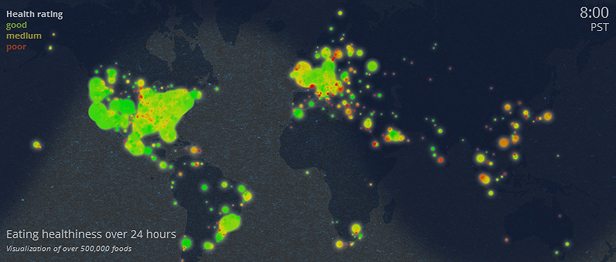App Shows Promise for Hacking Eating Behavior

Could a social app that is a kind of Instagram for food help save smart-phone users from their own eating habits? Users of an iPhone app called The Eatery snap photos of everything they eat, follow other users to see what they are enjoying, and rate the healthiness of one another’s meals. Now analysis of patterns in the 7.7 million ratings given to 500,000 meals is being used to plan a follow-up app that will steer people toward eating more healthfully.
Patterns found in that data show, among other things, that the healthiness of a person’s food choices inexorably decreases as the day wears on, that a person’s social network explains roughly a third of that person’s food choices, and that users’ healthiness scores correlate well with obesity rates in major U.S. cities. An infographic illustrates these and other facts and trends from the Eatery data.
The Eatery findings match up with published medical studies on eating habits and obesity. That similarity suggests that what looks like a fun mobile app could also become a powerful new way to intervene in people’s diets, says Aza Raskin, cofounder and chief vision officer of Massive Health, which released the app. “We found that for every hour of the day people eat worse,” he says. “That’s very actionable: if you decide between lunch at 12 or 2, at 2 you’ll eat 4 percent worse.” A mobile app that nudges people to eat lunch earlier might be able to cut many calories from their diets.
Raskin says his company is working on new mobile apps, but he’s coy about exactly what those products will do. He will say only that they will be intended as health tools to supplement treatment of serious diseases that have a lifestyle component, such as diabetes. Just using The Eatery for a month produced, on average, an 8 percent improvement in a person’s diet. “If you can nudge someone at the right time, we can get from an 8 percent change to 20, 30, or 40,” says Raskin.
Lora Burke, a professor at University of Pittsburgh’s school of nursing, says that many medical researchers too, herself included, are looking to mobile technology to make a better connection between patients’ lives and medical interventions into lifestyle.
Burke and colleagues recently reported results from a two-year study (dating from before the smart-phone era) in which people used a PDA to log their food intake. An app kept track of the calories they consumed and would dish out advice once a day—for example, suggesting that a user on track to exceed the day’s calorie allotment should opt for nonfat salad dressing at dinner.
People who received those notifications did significantly better at limiting their calorie intake than those who didn’t, says Burke (although there were no significant differences in weight loss). Her results have led her to conclusions similar to Raskin’s; she believes doctors could someday prescribe use of mobile apps. “We’re very good at getting people to lose weight [in the short term], but we’re very bad at getting people to maintain that,” she says.
Keep Reading
Most Popular
Large language models can do jaw-dropping things. But nobody knows exactly why.
And that's a problem. Figuring it out is one of the biggest scientific puzzles of our time and a crucial step towards controlling more powerful future models.
How scientists traced a mysterious covid case back to six toilets
When wastewater surveillance turns into a hunt for a single infected individual, the ethics get tricky.
The problem with plug-in hybrids? Their drivers.
Plug-in hybrids are often sold as a transition to EVs, but new data from Europe shows we’re still underestimating the emissions they produce.
Stay connected
Get the latest updates from
MIT Technology Review
Discover special offers, top stories, upcoming events, and more.